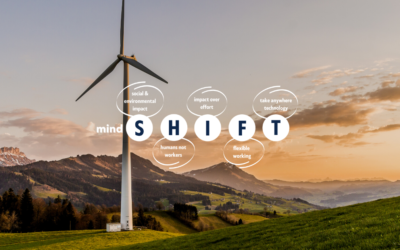With disruption comes the opportunity to shift; to re-imagine how we act, think and create. However, it also comes with a risk of being left behind if you don’t know how to navigate that disruption.
From the perspective of the telecommunications industry, this dependence on connectivity presents both opportunities and challenges. Digital connectivity is now weaved into the threads of our every-day lives. But where there’s digital connectivity, there’s also a digital divide, competing infrastructure development, digital convergence, and the demanding pressure of consumers, government and businesses.
So how can telecommunications players navigate the complex challenges that come with digital disruption?
What is needed is a mindSHIFT.
As we’ve noted in previous posts on the subject, mindSHIFT is all about taking action. Transformation isn’t just about ‘talking the talk’, it needs to be followed up by ‘walking the walk’.
When navigating disruption, a mindSHIFT encourages you to explore the five key fundamentals to the new age of business:
S: Social and environmental impact
H: Humans, not workers
I: Impact over effort
F: Flexible working
T: Take anywhere technology
Let’s explore how three core disruptions are planting the seeds for a mindSHIFT in the telecommunications industry.
Corporate Responsibility
The telecommunications industry is estimated to impact the local economy by a cumulative AUD $230b over the next decade and where there’s substantive economic benefit for telecommunications providers and retailers, consumers also expect social and environmental reciprocation. And we’re seeing the scope of corporate responsibility expanding as a result of consumer demand for climate action. Environmental, Social and Governance (ESG) strategy needs to become the norm for telecommunications executives.
Globally, British Telecom (BT), have developed a manifesto, outlining their goals for change. They explain “we’re taking a leadership position on climate change, the digital skills divide, and responsible tech and human rights”.
Singtel Group CFO, Arthur Lang expresses similar dedication, “we have doubled down on [sustainability] as part of our strategic agenda to create sustainable, long-term value.”
Locally, we’re already beginning to see how 5G and integrated wireless technologies are disrupting the market by improving flexibility and sustainability across healthcare, manufacturing and more, so we’re curious to see if Australian telecommunication players use this mindSHIFT to create more positive change.
For instance, these companies could ask themselves, how might they reimagine their waste management systems, manufacturing processes and site design, to create new opportunities for social and environmental impact?
Reconnecting Regions
There is increasing governmental funding for the telecommunications industry to minimise the digital divide and improve internet access for regional Australia.
Singtel Group CEO, Kuan Moon Yuen explains “companies have to quickly realise that digitalising is no longer an option – it is a necessity – and this means people will have to be brought along.” We can no longer survive on unreliable internet access or without digital literacy, we need robust services within regional areas, not just cities.
The redistribution of people and disruptions to work throughout COVID has shown that cities, once the centre of digital connectivity, now need to be considered in conjunction with regional and rural areas, to adopt a more holistic view of where people need reliable digital access.
In Germany, Deutsche Telekom is acting on this need to create equal access. Using ‘Dynamic Spectrum Sharing’ (DSS) they’re accelerating the expansion of 5G into rural areas, aligning with their ‘Connect the Unconnected’ and ‘Fast Internet in the city and in rural areas’ strategies.
Deutsche Telekom views access to state–of–the–art information technologies as a precondition for economic performance and participation in a knowledge and information society. By extending this access beyond cities, it can create better connections for untapped talent, opportunities for regional businesses and improve forms of communication across the country.
Alongside access (to information technologies) is a growing responsibility to support training and skills development. In the US, Verizon has shown a dedication to improving digital literacy, committing to providing 10 million youths with digital skills training by 2030 and improving digital inclusion through their partnership with the 4–H Tech Changemakers Initiative, to provide digital literacy training in rural black populations. It will be intriguing to see how this mindSHIFT influences the services telco organisations provide, and the social impact they create in the years to come.
Without improved regional connectivity, the digital divide could be reinforced, instead of reduced. With telecommunications receiving increasing funding for precisely such network expansion, telecommunications players will need to focus on providing robust services in regional Australia. In doing so, they will create better foundations for an improved and inclusive, Australia wide, digital economy.
Take Anywhere Technology
Increasing digital convergence over the past few decades has disrupted the way users interact with technology. With work, social lives and personal lives supported by portable devices, we are continually increasing our on-the-go content consumption from anywhere, at any time. As Deutsche Telekom says in its marketing materials, let’s “strive to bring people closer together, even if they’re miles apart”.
How might telecommunications organisations help to create seamless digital experiences at the customer and organisational level? Deloitte suggests a shifted focus on customers’ needs by taking a more nuanced approach.
By shifting perception of both employees and customers and viewing them as humans (and not just workers), companies can better understand digital needs.
Verizon has recognised that customers’ needs are changing within education; “millions of students here in the U.S. are lacking the connectivity, technology and skills required for success in today’s digital economy.” Through their education program Verizon Innovative Learning, they’re working to address these challenges. These kinds of programs, aimed at improving access and contribution to society, will not only sustain the telecommunications sector but could improve social cohesion, career prospects and have a broad economic benefit to society.
There is also a need to shift how you frame employee engagement, as teams continue to work simultaneously from home, the office and even overseas. By exploring flexible working, prioritising humans over ‘workers’ and impact over effort, companies can reposition themselves as facilitators of work-life balance, while maintaining or improving productivity.
This integration of digital experiences for employees and consumers alike is mindSHIFT in action. When you consider the key fundamentals of the new age of business, you can better create meaningful and impactful action, no matter what comes your way. Next time you encounter disruption, remember you’re not alone.
We’re here to help you explore how to create transformation during disruption through mindSHIFT, contact us today.



